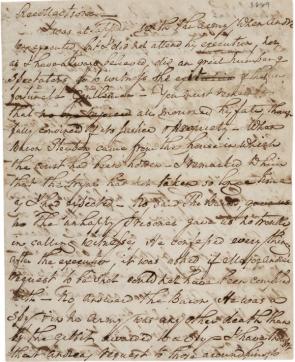Benedict Arnold’s 1780 treason and the execution of John Andre recalled, 1823
A Spotlight on a Primary Source by William North
 During the American Revolution, the discovery of General Benedict Arnold’s plot to surrender West Point to the British was a deeply shocking revelation. In a memoir written some forty years after the war, William North, an aide-de-camp to General Baron Von Steuben, recalled how the news of the plot was broken to the Army:
During the American Revolution, the discovery of General Benedict Arnold’s plot to surrender West Point to the British was a deeply shocking revelation. In a memoir written some forty years after the war, William North, an aide-de-camp to General Baron Von Steuben, recalled how the news of the plot was broken to the Army:
It was midnight, Horses were saddling officers going from tent to tent, ordering their men, in a suppressed voice, to turn out & parade no drum beat– the troops formed in silence & in darkness – I may well say, in consternation, for who in such an hour, & called together in such a manner, & in total ignorance of the cause, but must have felt, & feared the near approach of some tremendous shock –
John Andre, aide-de-camp of the British commander in chief, Sir Henry Clinton, was General Benedict Arnold’s contact. Andre was taken by the American forces and hanged as a spy in Tappan, New York, on October 2, 1780. Although many on both sides felt Arnold should have been the one to die for treason, Washington determined that he had no choice but to execute the captured British officer. William North wrote of the execution:
I was at Tappan with the army when Andre was executed, but I did not attend his execution, nor as I have always believed did an great number of spectaters go to witness the
executionexit of that unfortunate gentleman- You must remember thatno one rejoicedall mourned his fate though fully convinced of its Justice & propriety. . . . after the execution, it was asked if Major Andre’s request to be shot could not have been complied with– No, answerd the Baron He was a spy & in no army was any other death than by the gibbet awarded to a spy–
Excerpt
I was at Tappan with the army when Andre was executed, but I did not attend his execution, nor as I have always believed, did an great number of spectaters go to witness the execution exit of that unfortunate Gentleman– You must remember that no one rejoiced all mourned his fate though fully convinced of its Justice & propriety– When Baron Steuben came from the house in which the court had been holden– I remarked to him that the tryal had not taken so long a time as I had expected– No, said The Baron, gave us no The unhappy prisoner gave us no trouble in calling witnesses. He confessed everything. after the execution, it was asked if Major Andre’s request to be shot could not have been complied with– No, answerd the Baron He was a spy & in no army was any other death than by the gibbet awarded to a spy– I have thought that Andre’s request to those around him, to witness "that He died like a brave man", ought not to have been made. with respect to The story told in Lees memory history of the Southern War, respecting the attempt to take Arnold, in which it is said, or hinted, that another General Officer, was suspected by the Comdr in Chief all I can say is, that I never heared the remotest suspicion attaching to any one, of being concerned or in any Way implicated in Arnolds treason – It is true, it was a moment of alarm & fear, & doubt how far the treason might have extended but to have Suspicion to have allighted on anyone, much more a General Officer, I can not bring my mind to believe it– I remember the dark moment well in which the defection of Arnold was announced in [strikeout] pers, It was midnight, Horses were saddling officers going from tent to tent, ordering their men, in a suppressed voice, to turn out & parade no drum beat– the troops formed in silence & in darkness – I may well say, in consternation, for who in such an hour, & called together in such a manner, & in total ignorance of the cause, but must have felt, & feared the near approach of some tremendous shock –
